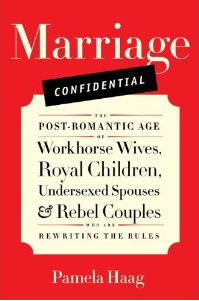Is Non-Monogamy the Secret to a Lasting Marriage?

For her new book Marriage Confidential: The Post-Romantic Age of Workhorse Wives, Royal Children, Undersexed Spouses, and Rebel Couples Who are Rewriting the Rules , Pamela Haag interviewed her married friends and acquaintances, surveyed recent studies and literature on marriage and then subsequently determined that romance, in marriage, is deceased. She paints contemporary marriages between "life partners," as she calls them, as "semi-happy," passionless affairs, ruined in part by gender equality, which, with all the requisite juggling and score-keeping, leaves us in tatters.
While looking for a way to "evolve marriage to suit our times," Haag presents non-monogamy as a potential salve for our post-romantic blues. In a spin on Laura Kipnis’ thesis in Against Love: A Polemic (in which Kipnis suggests that, for reasons largely economic, we are trapped and suffocated by marriage , as defined as a long, monogamous relationship), Haag says we should keep marriage, but forget about staying faithful . She believes the "genuinely sexually contented long-term marriage" is a near-impossibility and wonders why we don’t stick with our life partners while getting that one particular itch-passion-scratched elsewhere. Or, as her friend Beth puts it, "It’s just unrealistic to think that the person you talk to about hiring a plumber is going to be your big love affair."
Though discussing a clogged toilet might sound like the definition of sexually unappealing, research shows that life-partner types have the greatest sexual satisfaction and stronger relationship bonds. Furthermore, the evidence is scant that non-monogamy is the cure for the ambivalence and melancholy brought on by the semi-happy marriage.
Her thesis presupposes that the nature of marriage today makes married folks more in need of affairs than we were during the supposedly more romantic 20 th century. Yet, she provides no evidence that there is a link between these two. In fact, recent studies from the National Marriage Project show that rates of infidelity have not risen over the last two decades and have even decreased for some groups like married men. This is all while more and more people are saying "I do" to their life-partners. Haag doesn’t mention this.
Perhaps more importantly, she supplies no evidence that those trailblazers in non-monogamous relationships are any better off than those in monogamous ones. If the end goal here is to move a step or two up from "semi" on the happiness ladder – which seems to be what she is aiming for – I would like at least some evidence that infidelity will move us in that direction. At minimum, I would like proof that it would at least be romantic, but the majority of the affairs she recounts come off more as distractions than hot and heavy love stories. Take, for example, Lucy and Phil. She found out he cheated and talked about it as if it was a "grocery list," while he was "devastated" by the "sheer embarrassment" of hearing his wife discuss it in front of friends. And then there is Simone, who spent weeks exchanging "erotically charged letters" with a guy she met in a chat room, only to meet him at a bar and discover that the spark just wasn’t there.
Ultimately, there is something strange about Haag’s loyalty to the institution of marriage, which remains unwavering even as she all but fully disassembles it. We live in a time when there is less pressure to wed than ever before. If the idea of lifelong monogamy or at least attempting lifelong monogamy seems so unappealing, at a time when married couples are in the minority in the U.S., why bother to marry?
